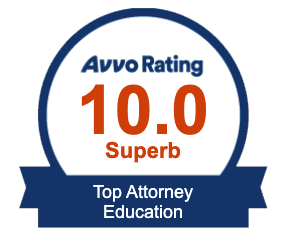I have attended two IEP meetings within the past week. Both of them very different from each other. One involved a second grade student diagnosed with ADHD, Bipolar Disorder, Adjustment and Conduct Disorders. This student was recently identified and determined eligible for special education and related services. The other child is a 10th grade student diagnosed with Autism, Intellectual Disability and Speech Impairment. He had been in special education most of his life. The child is nonverbal and has limited self-help, independent living skills, social skills, and toileting skills. The approaches for these two children – in terms of setting goals and objectives and relating services – were very different. But the ultimate goal is to develop an IEP for each child that provided educational benefits and a free appropriate public education.
Each IEP meeting has its own dynamics. For the child with ADHD, the school system had served him under a Section 504 Plan. The plan was inadequate to address this child’s behavioral challenges and deficits in reading fluency among other things. The school system had unduly delayed identifying and evaluating the child for special education under the IDEA. The psychoeducational evaluation conducted by the school was inappropriate. There was no occupational therapy or assistive technology evaluation conducted. The child was determined eligible for special education and related services under the category of Other Health Impaired and Emotionally Behaviorally Disordered. At the IEP meeting, the team focused mostly on the child’s challenging physical and verbal aggression and behaviors. The school system had conducted a perfunctory functional behavioral assessment and behavior intervention plan for the child while he was served by a Section 504 plan. It was incumbent to request an independent educational evaluation for the child because the school’s evaluation was inappropriate. It was also necessary to secure an appropriate functional behavioral assessment so that a proper behavior intervention plan could be developed and implemented. There were about ten educators at the IEP meeting but only the special education director and a couple of other staff spoke during the meeting. The challenge in this situation is get the special education director to facilitate other staff to contribute to the child’s IEP. We made some progress on this front. However, the special education director was clearly leading the meeting and making most of the suggestions and proposals for the child’s IEP, including goals, objectives, services, and placement. The legal guardian of the child, who was not the parent, did not have much knowledge of special education laws so my role was more of an advocate for the child. It is usually better when the parent or guardian is vocal and assert their concerns about the child’s educational programming. In absence of an active parent or guardian, a special education attorney’s role is more pronounced and weighty.
My other random thoughts on special education law concern the 10th grade student with autism and intellectual disability. The mother, who was savvy but relatively quiet at the meeting, had a number of serious concerns about her child’s IEP and its implementation. There were able a dozen school staff, including occupational, speech and language, assistive technology, and vocational specialists. In fact, a representative from the Department of Vocational Rehabilitation attended the IEP meeting which is quite unusual. The parent invited an educational advocate to the meeting who had more than 25 years of teaching experience with children with autism and severe disabilities. Working in tandem with an experienced educational advocate is important so that everyone is on the same page in securing appropriate services for the child. We addressed all aspects of the IEP for the child. Some changes were made in the goals and objectives. The transition plan was modified to address more of the child’s prevocational needs. The primary parental concerns of communication, self-help and independent life skills, especially toileting, vocational and behavioral challenges were properly addressed at the IEP meeting. Most of the members of the IEP team were active and vocal in expressing their concerns and suggestions. The parent’s primary concerns were addressed but still she feared because of past experiences with the school that the revised IEP services would not be implemented. It is true that you can develop a great IEP on paper, but if it is not implemented properly it fails to provide an educational benefit for the child. To insure an IEP is properly implemented takes a great deal of effort by both the parents and school system. For ideas how to monitor an IEP and its implemented, see http://www.wrightlaw.com.

